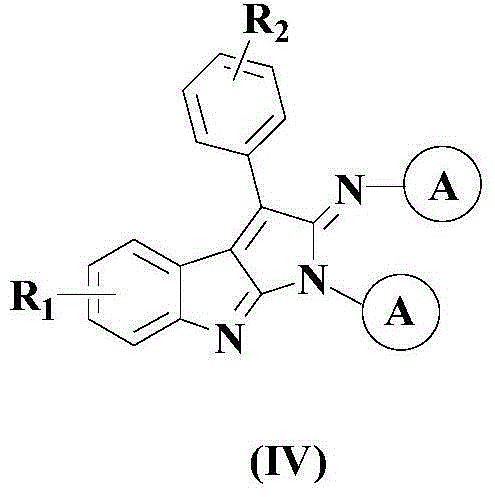Synthetic method of pyrrol-indole compound as drug intermediate
A synthesis method and compound technology, which are applied in the synthesis of fused ring compounds and the synthesis of pyrroloindole compounds, can solve problems such as affecting industrial scale-up production efficiency and safety, using highly toxic reagents, and narrowing the scope of application of substrates. , to achieve the effect of good application prospects and broad market promotion value
- Summary
- Abstract
- Description
- Claims
- Application Information
AI Technical Summary
Problems solved by technology
Method used
Image
Examples
Embodiment 1
[0039]
[0040]At room temperature and under a nitrogen atmosphere, add 100 mmol of the above formula (I) compound, 140 mmol of the above formula (II) compound, 200mmol upper formula (III) compound, 15mmol composite catalyst (for 5mmolPd 2 (dba) 3 Mixture with 10mmol trimethylphosphine (copper hexafluoroacetylacetonate), 5mmol gallium trichloride and 200mmol organic base 2,4-lutidine, then heat up to 70°C and insulate and fully stir for 6 hours;
[0041] After the reaction is finished, filter the reaction system, cool the filtrate to room temperature, adjust the pH value to neutral, add deionized water to fully shake and wash, then extract 2-3 times with chloroform, combine the organic phases, and dry over anhydrous magnesium sulfate. After distillation under reduced pressure, the obtained residue was separated by silica gel column chromatography, and acetone and ethyl acetate in equal volume ratio were used as washing liquids to obtain the compound of the above formula (I...
Embodiment 2
[0044]
[0045] At room temperature and under a nitrogen atmosphere, add 100 mmol of the above formula (I) compound, 200 mmol of the above formula (II) compound, 250mmol formula (III) compound, 24mmol composite catalyst (for 6mmolPd 2 (dba) 3 Mixture with 18mmol trimethylphosphine (copper hexafluoroacetylacetonate), 8mmol gallium trichloride and 250mmol organic base 2,4-lutidine, then heat up to 80°C and insulate and fully stir for 5 hours;
[0046] After the reaction is finished, filter the reaction system, cool the filtrate to room temperature, adjust the pH value to neutral, add deionized water to fully shake and wash, then extract 2-3 times with chloroform, combine the organic phases, and dry over anhydrous magnesium sulfate. After distillation under reduced pressure, the obtained residue was separated by silica gel column chromatography, and acetone and ethyl acetate in equal volume ratio were used as washing liquids to obtain the compound of the above formula (IV) wi...
Embodiment 3
[0049]
[0050] At room temperature and under a nitrogen atmosphere, add 100 mmol of the above formula (I) compound, 170 mmol of the above formula (II) compound, 300mmol formula (III) compound, 20mmol composite catalyst (for 6mmolPd 2 (dba) 3 Mixture with 14mmol trimethylphosphine (copper hexafluoroacetylacetonate), 10mmol gallium trichloride and 300mmol organic base 2,4-lutidine, then heat up to 85°C and insulate and fully stir for 4 hours;
[0051] After the reaction is finished, filter the reaction system, cool the filtrate to room temperature, adjust the pH value to neutral, add deionized water to fully shake and wash, then extract 2-3 times with chloroform, combine the organic phases, and dry over anhydrous magnesium sulfate. After distillation under reduced pressure, the obtained residue was separated by silica gel column chromatography, and acetone and ethyl acetate in equal volume ratio were used as washing liquids to obtain the compound of the above formula (IV) w...
PUM
 Login to View More
Login to View More Abstract
Description
Claims
Application Information
 Login to View More
Login to View More - R&D
- Intellectual Property
- Life Sciences
- Materials
- Tech Scout
- Unparalleled Data Quality
- Higher Quality Content
- 60% Fewer Hallucinations
Browse by: Latest US Patents, China's latest patents, Technical Efficacy Thesaurus, Application Domain, Technology Topic, Popular Technical Reports.
© 2025 PatSnap. All rights reserved.Legal|Privacy policy|Modern Slavery Act Transparency Statement|Sitemap|About US| Contact US: help@patsnap.com



